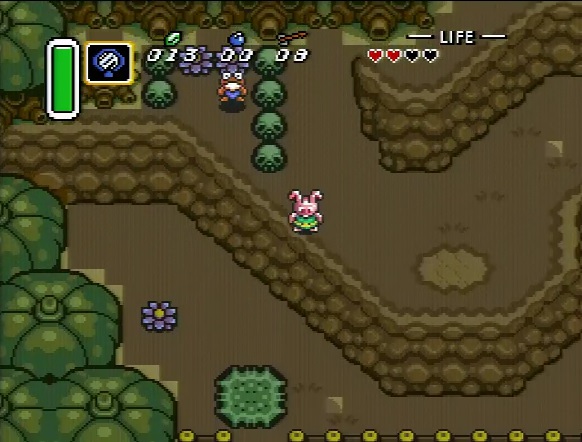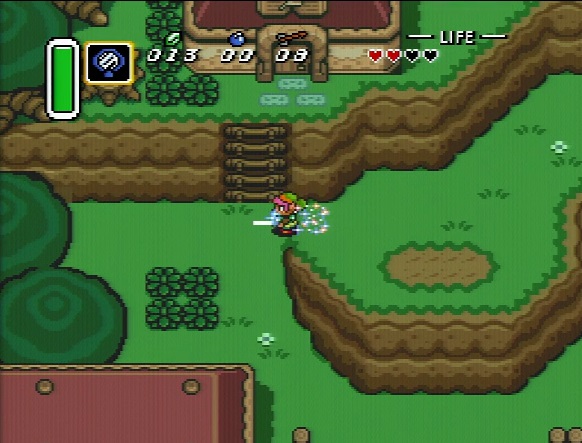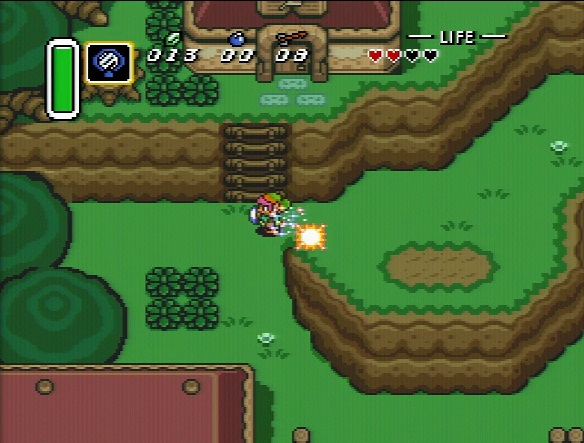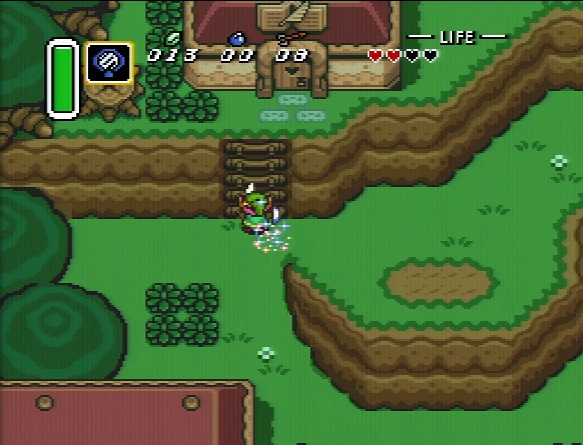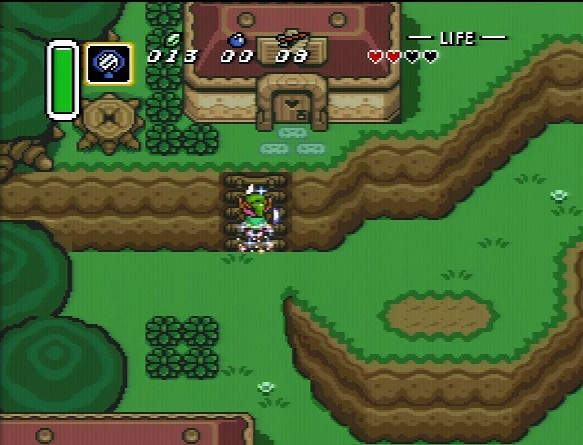Difference between revisions of "Early Tempered"
| Line 49: | Line 49: | ||
=== The mirror jump === | === The mirror jump === | ||
| − | [[ Mirror | + | [[ Mirror Jumps | See Mirror Jumps for more information ]] |
The hard method is to do it completely bufferless (just hold `<`, wait 19 frames or so, and press `Y`). Jadin made that work, by using his controller to tap out a rhythm. He'd press `<` (holding), `L`, `R` and `Y`. But it's frame perfect and for now, only Jadin has been able to do it in runs. | The hard method is to do it completely bufferless (just hold `<`, wait 19 frames or so, and press `Y`). Jadin made that work, by using his controller to tap out a rhythm. He'd press `<` (holding), `L`, `R` and `Y`. But it's frame perfect and for now, only Jadin has been able to do it in runs. | ||
Revision as of 18:26, 4 January 2017
The purpose of early tempered is to get the tempered sword without having to get the titan's mitt first. The purpose of the trick is to reach the smith that you must bring back to his brother to get your sword tempered.
Contents
The "easy" method (5 mirrors)
Example VOD doing all the steps: https://www.twitch.tv/poor_little_pinkus/v/82080377?t=14m04s
Position 1
Align with skulls, and hold `v` untill you hit the ledge. Mirror.
Position 2
Walk left, out of the warp, and nudge right, untill you are on the left side of this warp. There's a huge number of pixels that works for this one, so no need to be very exact. I do dash buffers while holding the sword out to nudge Link controllably. A dash buffer is just pressing a dpad direction and dash on the same frame. It makes it much easier to move one pixel at a time.
The reason you walk out of the warp, then into it, is because it saves 2 seconds for whatever reason. When Link is just standing inside the warp, it takes ~12.5 seconds to warp, whereas if you move out of it, then into it again, it takes only ~10.5 seconds. But there's no shame in taking the two second hit for consistency, and ignore all that.
In Dark World, you just mirror back ASAP (spam that `Y` button).
Position 3
Again, walk out of the warp, and nudge back into it. My cue here is Link's hat, making some kind of bubbly figure out of the right side of the stairs.. That's a weird cue I just realized, but it works. Could try using sword or shield as cue too. There's a bunch of pixels that works for this one as well.
In Dark World, just mirror back.
Position 4
Go up the stairs, nudge down. You want to be on one of the two topmost warp pixels for this one. You can put Link on a correct pixel before the warp invulnerability period is over (Link still blinking), by using the sword as cue (if it covers the black shadow there, you're at the topmost position that will work).
Another way to do this one is to go above the warp, wait until Link stops blinking, and then walk down into the warp.
In Dark World, hold ^ until you hit the skulls, and mirror back.
Position 5
You can use the same sword cue for this one, if you want to go right to the topmost pixel. But on this one, only the topmost pixel will work.
So if you decide to wait until Link stops blinking to nudge down, it's important not to accidentally go 2 frames `v`, because that might put you 1 pixel too far south, which won't work. But it's pretty safe if you use dash buffers.
The mirror jump
See Mirror Jumps for more information
The hard method is to do it completely bufferless (just hold `<`, wait 19 frames or so, and press `Y`). Jadin made that work, by using his controller to tap out a rhythm. He'd press `<` (holding), `L`, `R` and `Y`. But it's frame perfect and for now, only Jadin has been able to do it in runs.
Luckily, the frog is jumping up and down, and it's doing so in a consistent manner, so we can use its animation frames for cues.
- Start out holding `<`. This should be done while warping back to Dark World. You will keep holding `<` for all these steps.
- The frog will first jump up, then down, then up again. You want to use select buffers so that you stop him on this exact animation frame:
-
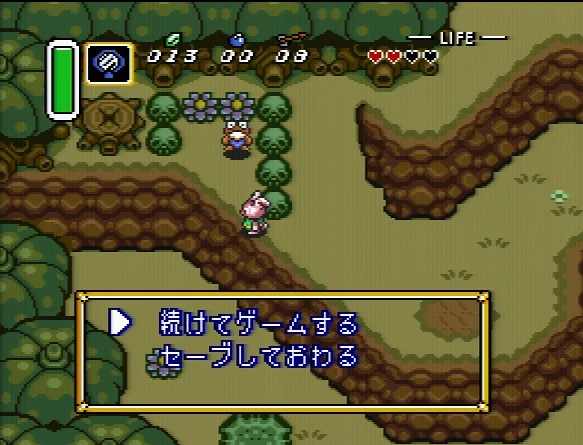
- It's his topmost position, after he has jumped up and down once.
- The kicker here, is that there's no way of actually knowing exactly which animation frame you are on since he will have this height for *two* frames. So you don't know if you stopped it at the first or the second frame. You want to stop it on the first frame. Make sure you're consistent at select buffering one frame to remedy this.
-
- From here, you want to cancel the menu, wait one frame, then press `Y`. So there's a slight space between the cancel menu input and the mirror input.
- The only good way of learning this is to practice. It's just a rythm/technique. My personal technique is similar to what you'd do if you wanted to type out "iu" fast on a keyboard. I also rotate my controller slightly, so the Y and B buttons are easier to hit this way. Then I type out the word "iu" (pressing `B` then `Y`) with my long and index fingers. I have not found a way to do this consistently; sometimes you'll get it in all your runs, other days none.
- A much unsafer method is to try to select buffer it one more frame. That could make it slightly easier to cancel the menu into mirror next frame, skipping the one frame of spacing between the inputs. But the problem with doing that is that the frog won't move at all, and so there's no good way to tell if you did it correctly or not. Link's animation MIGHT move, making it obvious that you advanced a frame, but I think that's based on frame rules or something, because that definitely doesn't always happen. So you risk frame advancing without realizing it if you do it this way.
The HARD method (4 mirrors)
It's a stupid method. If you're good enough at the game to need this time save (about 14-16s?), you're probably good enough that you know about it already anyways.
For the curious, it consists of doing 4 unbuffered mirror jumps in a row. (You can do it buffered too, but that's not faster than the method above, which only has one mirror jump and is thus a lot easier.)
